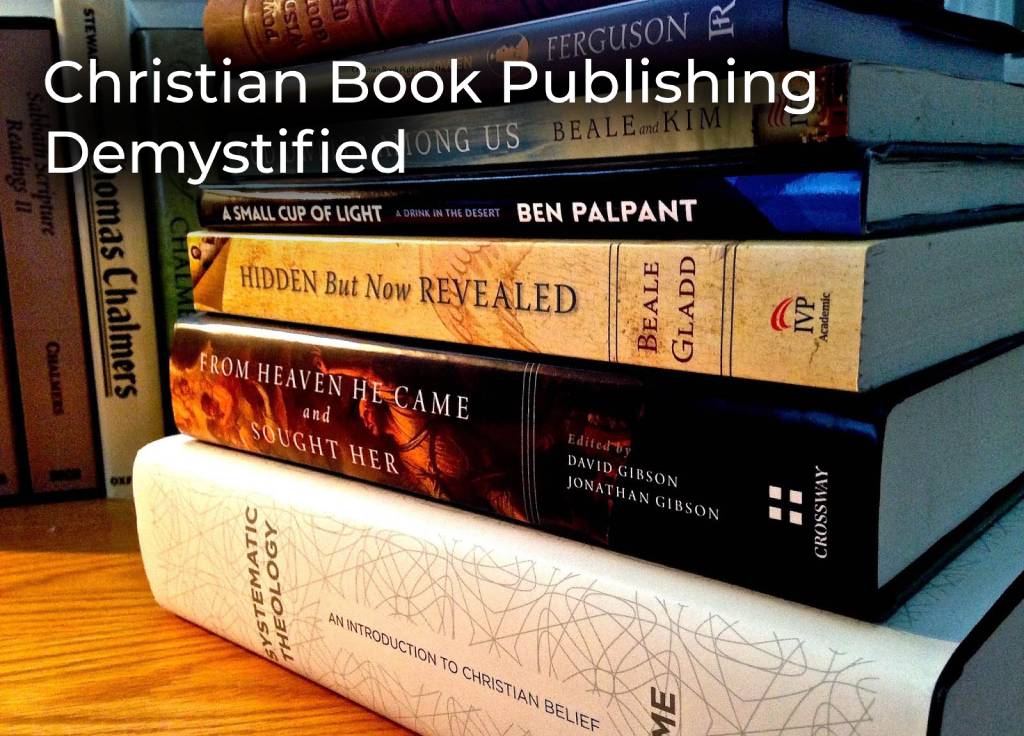As I inch toward achieving the goal of releasing my men’s ministry book, Warrior Disciple, I’ve dived into seeing what the best way of publishing it is. Book publishing, even from a Christian perspective, is a big, daunting world to explore, and here’s what I’ve learned so far.
The Big Picture
Ever wondered how Christian books make it to the shelves? Let’s demystify the process and take a stroll through the world of Christian publishing, a small but significant part of the vast worldwide publishing industry. Here’s a glimpse of how it all comes together from my point of view.
Agents: The Matchmakers
Most serious, professional authors have a literary agent, a person who connects them with publishers for a cut of the profits (usually around 15%). These agents are like matchmakers, pairing authors with the right publishers and helping them get the best deals. Some publishers love working with agents, while others, not so much. But good agents can make a world of difference.
The Good, the Bad, and the Ugly of Agents
There are some fantastic agents out there, but there are also some who might take advantage of eager authors. If an agent approaches you, do your homework and ask for references. And don’t ask me to hook you up with one – I just can’t do that!
Let’s break down a bit more on the positives, the negatives, and the pitfalls of having a literary agent:
On the good side, agents can be your best allies. They know the industry inside and out, negotiate better deals, and often have connections that can get your foot in the door. They can guide you in shaping your proposal, offer advice on contracts, and even help with marketing strategies.
But then there’s the bad. Some agents might not have your best interests at heart, pushing you towards deals that benefit them more than you. They might be unresponsive or lack the expertise they claim to have.
And the ugly? There are those who might take advantage of new authors, charging upfront fees without delivering results, or locking you into restrictive contracts that limit your opportunities.
Like any relationship, finding the right agent requires careful consideration, research, and sometimes, a bit of luck. The right agent can be a powerful partner in your publishing journey, but the wrong one can lead to frustration and disappointment.
Going Solo
You don’t always need an agent. Some authors go directly to publishers, but it’s a longer road with fewer guarantees. Knowing someone in the publishing company can be a game-changer, though.
Show Me the Money
Christian publishers might be businesses, ministries, or a combination of both, but they all need to balance the books. Contracts usually include royalties (a percentage of the book’s sale price) and advances (an upfront payment). These financial aspects can vary widely, and there’s often room for negotiation. But there are some common numbers that you may expect:
Let’s start with agents. They typically take around 15% of an author’s earnings as their fee for representing them. Then there are royalties, which are the author’s cut from each book sold. These can vary, but an average royalty might be around 20% of the wholesale price.
Advances are upfront payments made to the author, ranging from a few thousand dollars for new authors to much more for established names. It’s important to note that advances are deducted from future royalties, so authors won’t see additional royalty payments until the advance is “earned out.”
Some publishers might also have fees for specific services like marketing or special formatting.
And don’t forget about self-publishing platforms like Amazon’s KDP, where authors can earn up to 70% royalties on eBooks.
Navigating the financial landscape of Christian publishing requires a keen understanding of these percentages and fees, and a clear-eyed approach to contracts and negotiations.
The Balancing Act
Publishing is a dance between risk and reward. Authors invest time and effort, while publishers invest money. Both sides want the best deal, and that’s where the tug-of-war begins.
Authors and Their Platforms
Publishers used to help authors build their reach or “platform.” Nowadays, they expect authors to have a following already. It’s easier for a mediocre writer with a big platform to get a contract than a brilliant writer with a small one. Fair? Maybe not, but that’s the business.
Publishers: A Diverse Bunch
Christian publishers come in all shapes and sizes. Some are independent, some are part of big publishing houses, and they all have their unique flavors and preferences.
Self-Publishing: A Valid Option FOR TODAY
Ten or so years ago, self-publishing was seen as a vanity project, a way for authors to bypass the gatekeepers of traditional publishing. But oh, how times have changed! Today, self-publishing is a legitimate and often lucrative path for authors, and it’s thanks in large part to platforms like Amazon and their Kindle Direct Publishing (KDP) service.
I’m personally taking the self-publishing route with my upcoming book, Warrior Disciple, and I’ve learned quite a bit about it along the way:
Amazon: The Game Changer – Amazon has revolutionized the self-publishing landscape. Through KDP, authors can publish their eBooks and paperbacks for free, reaching readers all over the world. No longer confined to the whims of traditional publishers, authors have the freedom to set their prices, choose their book’s appearance, and make updates whenever they want. Amazon’s vast marketplace provides visibility that was once nearly impossible for self-published authors to achieve.
Kindle Direct Publishing (KDP): How It Works – KDP is a user-friendly platform that guides authors through the publishing process. You can upload your manuscript, design your cover (or use a pre-made template), and set your book’s price. KDP also offers promotional tools to help you market your book. Once published, your book is available on Amazon’s websites globally, and you earn up to 70% royalties on sales. For those who want to offer print versions, KDP’s print-on-demand service means you don’t have to invest in a large print run. Books are printed as they’re ordered, reducing risk and overhead.
The Pros and Cons – Self-publishing with Amazon and KDP is not without its challenges. While it offers unparalleled freedom and potential reach, it also requires authors to wear many hats. You’re responsible for the quality of editing, design, layout, marketing, and more. The competition is fierce, and standing out in the crowded marketplace can be tough. But for those willing to invest the time and effort, the rewards can be significant. Success stories abound of authors who were rejected by traditional publishers, only to find their audience through self-publishing.
In the ever-changing world of publishing, self-publishing, especially through platforms like Amazon and KDP, has become a viable and often preferred option for many authors. It’s a path that demands more control but offers more rewards, reflecting the entrepreneurial spirit of today’s writers.
The Publishing Journey
Publishing a Christian book is a journey that starts with an idea and ends with a finished product on the shelves. It involves collaboration between authors, agents, editors, designers, and more. Here’s a step-by-step look at the process:
- Idea & Proposal: The author and agent co-create a proposal.
- Submission & Acceptance: The agent sends the proposal to suitable publishers.
- Contract & Writing: Once agreed, the author has a set time to write the manuscript.
- Editing & Endorsements: The manuscript goes through several rounds of editing and is sent to endorsers.
- Design & Printing: The book is designed, printed, and shipped to warehouses.
- Release & Promotion: The book is released, and the author may engage in interviews, media appearances, and speaking engagements.
A Slow but Steady Process
The publishing process might be slow and unknown at times, but don’t let that deter you, especially if you feel led by God to get a book out to a Christian audience. Publishing is a methodical, well-trodden path that may lead to something extraordinary for the Kingdom.
Imagine the thrill of seeing your ideas take shape, the satisfaction of overcoming challenges with each edit, the anticipation as your book’s design is finalized, and the sheer joy of holding the first printed copy in your hands. Picture your words reaching hearts and minds across the globe, inspiring, challenging, and comforting readers you may never meet. Every step of the way, from the first spark of an idea to the final release, is filled with discovery, growth, and fulfillment. It’s not just about producing a book; it’s about embarking on a creative journey that’s uniquely yours, filled with opportunities to learn, connect, and most importantly, stretch and build your faith in God.
If you’ve ever dreamed of becoming an author, the world of Christian publishing awaits you with open arms. Embrace the process, savor the journey, and be faithful to the Lord’s calling. Your authoring ministry matters, and there’s no better time to start telling it than now.


One Comment
Daniel W Riffe
Hello, I’m trying to find a publisher that will publish my book and take the fee out of my royalties Thank you.